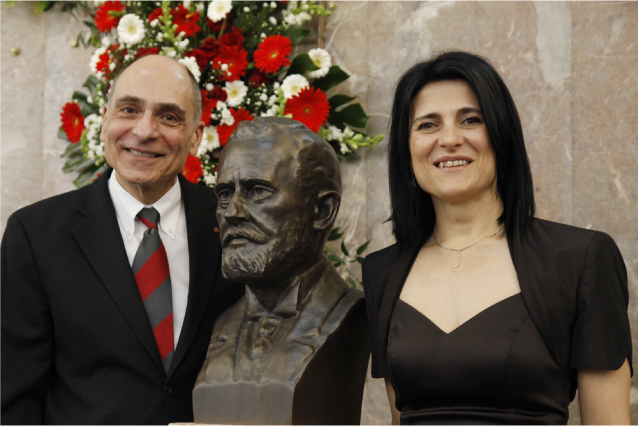News Archive
Amparo Acker-Palmer wins The Paul Ehrlich and Ludwig Darmstaedter Prize for Young Researchers

Prof. Dr. Charles Dinarello (l.) and Prof. Dr. Amparo Acker-Palmer (r.)
29. September 2009 - FRANKFURT. The 60,000 euro Prize for Young Researchers will be awarded to the Frankfurt-based scientist Amparo Acker-Palmer, 41, of the Cluster of Excellence Macromolecular Complexes, Frankfurt, for her “fundamental contributions to the understanding of the role of Ephrins and Eph receptors and their importance for neural and vascular network formation”. The decision to confer the award on her was made by the Board of the Paul Ehrlich Foundation.
The Paul Ehrlich and Ludwig Darmstaedter Prize is among the most prestigious international prizes awarded in the Federal Republic of Germany in the field of medicine. The award ceremony will take place at the Paulskirche in Frankfurt on 14 March 2010, the birthday of Paul Ehrlich (1854–1915).
Similar mechanism within neural and vascular network formation
Blood vessels and nerve fibres course throughout the body in an orderly pattern, often alongside one another. One exciting discovery of the last decade is that the wiring or neural and vascular networks is controlled by similar mechanisms involving a fine-tuned guidance by attractive and repulsive cues. Amparo Acker-Palmer's research interest is to understand the common molecular transduction mechanisms within neural and vascular network formation and remodelling. Neurons communicate with each other via Synapses. These sites of contact are formed, stabilized and disappear constantly and this plasticity underlies learning and memory processes. Ephrins are membrane bound ligands for Eph receptors and are important molecules for the maturation and stabilization of synapses. The ephrinB ligands transduce intracellular signals and Amparo Acker-Palmer has focused her work in the last years to understand the molecular transduction pathways activated by ephrinB ligands at the synapse. She has not only shown the molecular mechanism how ephrinB ligands control maturation of synapses but also recently discovered how these ligands directly regulate synaptic function by controlling the internalization of AMPA receptors, the main transducers of rapid excitatory transmission in the brain. Moreover, Prof. Acker-Palmer has now started to expand her observations from the nervous system to blood vessels and discovered a parallelism in the molecular pathways used by ephrinB ligands to control the internalization and activation of receptors important for vessel guidance during tumor angiogenesis.
Prof. Dr. Amparo Acker-Palmer, was born in Sueca, near Valencia, Spain, on 10 September 1968, and studied biology and biochemistry at the University of Valencia. She spent the years 1992 to 1996 working on her doctorate “Characterization of the proteasome in different subcellular locations” at the Instituto de Investigaciones Citologicas in Valencia and in 1997 won the University of Valencia’s prize for the best PhD submitted. She then embarked on a course of postdoctoral study at the European Molecular Biology Laboratory (EMBL) in Heidelberg and in 2001 switched to the Max Planck Institute of Neurobiology in Martinsried near Munich, where she headed the Junior Research Group Signal Transduction. She was appointed to the Macromolecular Complexes Center of Excellence at the Goethe University, Frankfurt, in 2007. Prof. Amparo Acker-Palmer is a member of the American Society for Biochemistry and Molecular Biology (ASBMB), the Interdisciplinary Center for Neuroscience Frankfurt (ICNF), the Frankfurt Center for Membrane Proteomics (CMP) and the German Neuroscience Society (GNS).
Links:
Further information about Amparo Acker-Palmer and her research
Further information about the Paul Ehrlich and Ludwig Darmstaedter Prize

